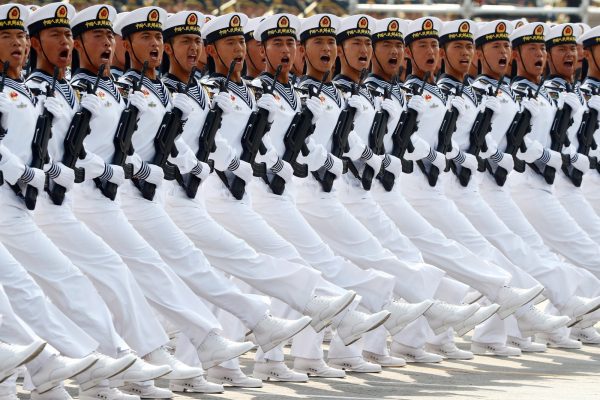The U.S. can win the competition against Beijing only by making it multilateral.
In its contest with China, America has a geographical problem: Its most powerful block of allies, the NATO countries, are on the other side of the world. That has led to a transatlantic awkwardness in dealing with China, and it’s triggering debate on how European countries can best defend the balance of power in the Indo-Pacific region.
What’s tricky is that the militarily sensible answer is not the strategically astute one. America’s NATO allies cannot save the day militarily in the Indo-Pacific. But they can do something more important: help Washington turn a bilateral confrontation with China into a multilateral one.
Although the U.S.-China competition is centered in the Indo-Pacific, Europe will play a crucial role. NATO’s European members still represent the world’s largest concentration of advanced democracies and its most economically and militarily formidable cluster of U.S. allies. But because most European countries are located so far from the frontlines, they have been relatively slow to awaken to the Chinese threat. This asymmetry has produced some glaring divergences, such as when the European Union concluded a Comprehensive Agreement on Investment with Beijing just as President Joe Biden was taking office.
Fortunately, European policies seem to be headed in the right direction, albeit gradually, even if the rhetoric of leaders such as Angela Merkel and Emmanuel Macron is more equivocal. Since early 2020, several European countries have made it harder for Huawei to build their 5G telecommunications networks. The EU sanctioned Beijing over its atrocities in Xinjiang earlier this year, evoking a furious Chinese response that has left the CAI in jeopardy.
Perhaps most interesting, several key U.S. allies are showing more interest in Indo-Pacific defense. France recently led naval exercises with the Quad — America, Australia, India and Japan — in the Bay of Bengal. A British aircraft carrier task force will deploy to the Indo-Pacific next month. Paris and London have dispatched naval vessels to the South China Sea. Other countries, including Germany, are rolling out strategies for upholding stability in the Indo-Pacific. There are even rumblings about how European militaries might help defend Taiwan from a Chinese attack.
Yet not all American defense analysts are pleased with this activity. There are two contrasting views on what role Europe should play in the Sino-American rivalry.
One view is that Washington should encourage this globalization of European defense interests. True, in a crisis, even powerful NATO allies — namely France and the U.K. — can’t make decisive contributions to defending Taiwan. But through peacetime engagement, they can make clear that there is a global interest in preserving a free and open Indo-Pacific and defending vulnerable states from aggression. And they can add something, whether attack submarines or other naval vessels, to the collective response America would rally in a conflict. By doing so, they would enlarge the coalition of states Beijing must bloody to revise the status quo in the Indo-Pacific, thereby raising the strategic costs of aggression for China.
The second view is that America should instead prioritize a stricter regionalization of European defense. These analysts argue that the gravest threat to America’s ability to fight and win in the Indo-Pacific is the persistence of taxing defense commitments elsewhere. So rather than ask European governments to project relatively limited military power into faraway oceans, Washington should persuade them to assume more of the defense burden in Europe and other regions closer to home, such as Africa and the Middle East. If NATO does more to address second-tier threats such as Russia and international terrorism, then the U.S. can focus squarely on China.
Militarily, the second approach is more efficient. A pound of UK military spending will buy more capability in the North Atlantic or the Baltic than it will in the Indo-Pacific. European allies need to do more to shore up NATO’s eastern flank. And the idea of promoting maximum efficiency while protecting America from military distractions is alluring.
Yet the calculus of employing European defense capabilities is not as straightforward as it might appear.
If the U.S. does less in Europe and the Middle East, the Europeans may not do more. When the U.S. announced that it was leaving Afghanistan, so did its NATO allies. If Washington becomes less engaged in Europe, the result could be a fragmented NATO that would struggle to meet the Russian threat.
The regionalized approach also involves an oddly paternalistic attitude toward the allies America is seeking to rally. Presidents of both parties have spent years trying to convince the NATO allies to take the China challenge more seriously. It would be odd indeed if, once the Europeans started moving in the right direction, America simply instructed them that their “real” interests are regional, not global.





